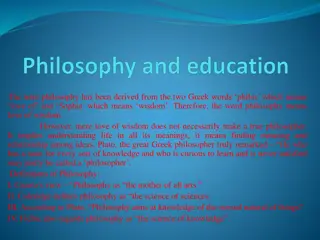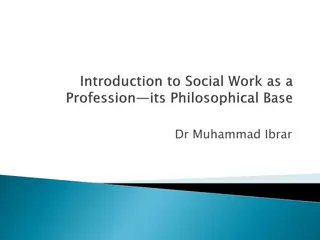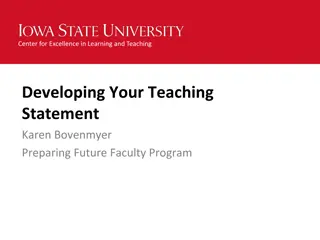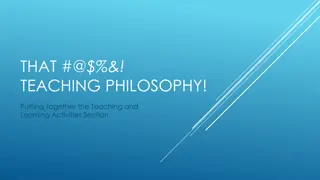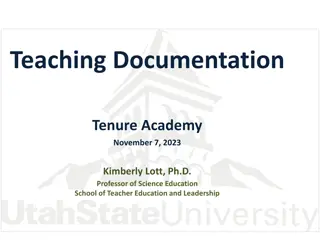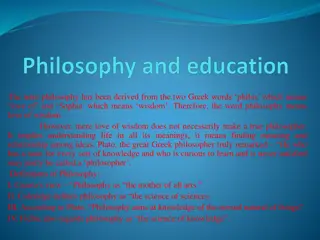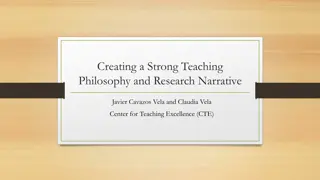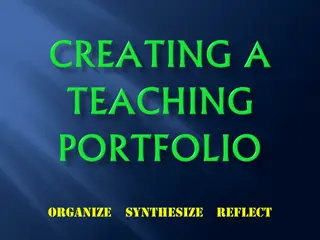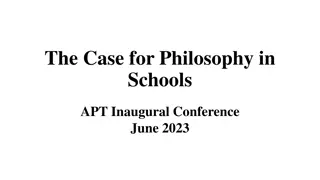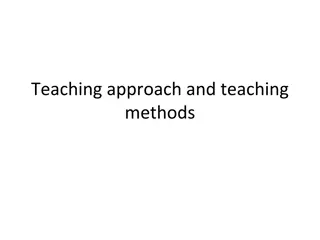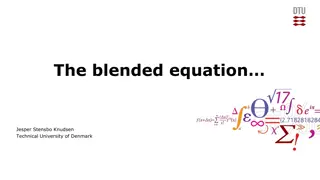Teaching Philosophy - Workshop Session Highlights
Uses of teaching philosophy statements, templates, and preparation tips for the academic job market series. Understand how a teaching philosophy statement can showcase your dedication to student learning and instructional development.
Uploaded on Feb 18, 2025 | 0 Views
Download Presentation

Please find below an Image/Link to download the presentation.
The content on the website is provided AS IS for your information and personal use only. It may not be sold, licensed, or shared on other websites without obtaining consent from the author.If you encounter any issues during the download, it is possible that the publisher has removed the file from their server.
You are allowed to download the files provided on this website for personal or commercial use, subject to the condition that they are used lawfully. All files are the property of their respective owners.
The content on the website is provided AS IS for your information and personal use only. It may not be sold, licensed, or shared on other websites without obtaining consent from the author.
E N D
Presentation Transcript
Click to edit Master title style Academic Job Market Series TEACHING PHILOSOPHY WORKSHOP
Todays Session Agenda Explanation of the Uses of a Teaching Philosophy Statement Teaching Philosophy Template Interviews and Idea Generation
Academic Job Market Series Letter of Intent Format Teaching Philosophy Clear thesis Interview Skills Video Presentation CV Format Click to edit Master title style Content Tailored Discussion Well- developed examples Outlined responses
Preparation Consider how your statement will complement your letter of intent Read multiple examples of teaching philosophies from your field and from the broader academy Brainstorm anecdotes that you can use in the your statement
The Uses of a Teaching Philosophy Statement It is learner-focused, offering concrete evidence of a candidate s attentiveness to student learning (rather than just content) and awareness of and ability to deal with student differences in the classroom. It conveys thoughtful reflection and provides evidence that an applicant is enthusiastic about teaching, seeing it as an integral part of their research program.
The Uses of a Teaching Philosophy Statement The TPS offers evidence of practice, proving that a candidate can discuss their approach to instructional challenges and their plans for future pedagogical development. It is carefully proofread and readable: every sentence needs to be concise and carry the narrative forward. (O Neal, Meizlish, and Kaplan, CRLT Occasional Paper #23).
Teaching Philosophy Template Introduction: Description of primary teaching experience Explanation of a particular challenge that you faced or outcome that you wanted to get across to your students Statement about how this example reflects your process or values as an instructor.
Teaching Philosophy Template Detailed description of challenge or outcome: The challenge might be getting students to participate during a large lecture section or it might involve using a particular technique in the classroom The learning outcome could be very specific to your field. For instance, in English, faculty members advocate close reading as an important outcome and will tailor lessons accordingly
Teaching Philosophy Template Discussion of innovations or pedagogical techniques Explain the intervention, including any materials used or pedagogies consulted Concluding Paragraph Discussion of any other instructional development and pedagogy that you have consulted.
University of Michigan CRLT Teaching Philosophy Resources
Sharing Your Ideas about Teaching and Learning What is a learning objective that you (or your professor, if you are a TA) try to emphasize in a particular course? Explain a class activity that you have created to help the students achieve that learning objective I believe the role of the instructor is: Students learn best when:
Group Work Activity 1. Describe a teaching highlight to your partner and allow them to ask you questions about your experience. 2. Switch roles, and listen as your partner describes their teaching highlight and then ask them questions about it. 3. Be prepared to share each other s examples with the group.


